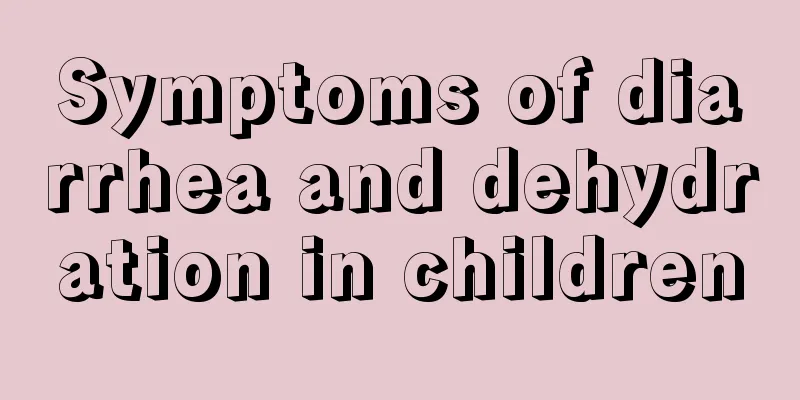What to do if your child has gastroenteritis and vomits

|
Gastroenteritis is actually a very common disease. For adults, because their resistance is stronger, taking some medicine can relieve the symptoms, and they will not be too serious. But this is not the case for children. Because children have weak resistance, once they suffer from gastroenteritis, they will suffer from severe diarrhea and vomiting. So what should we do if we encounter children with gastroenteritis and vomiting? Gastroenteritis is usually caused by microbial infection, but can also be caused by chemical toxins or drugs. Typical clinical manifestations are diarrhea, nausea, vomiting and abdominal pain. In healthy adults, gastroenteritis usually causes only discomfort and inconvenience without causing serious consequences, but in seriously ill, debilitated, very young, or elderly patients it can cause life-threatening dehydration and electrolyte disturbances. Infectious gastroenteritis can be caused by infection with viruses, bacteria, or parasites. Toxins and drugs can cause chemical gastroenteritis. Viral infection is the most common cause of gastroenteritis. There are many viruses that can cause gastroenteritis, the most common of which is rotavirus, followed by Norwalk virus, astrovirus and enteric adenovirus. Common routes of infection include: food (especially seafood), contaminated water sources, contact with infected people, unclean tableware, and not washing hands before eating. The type and severity of gastroenteritis symptoms depend on the type and amount of the microorganism or toxin. The most common symptom is diarrhea. Other symptoms include: abdominal pain, nausea, vomiting, fever, loss of appetite, weight loss (which may be a sign of dehydration), heavy sweating, cold and clammy skin, muscle pain or joint stiffness, fecal incontinence, etc. Severe vomiting and diarrhea can quickly lead to dehydration, the symptoms of which include weakness, extreme thirst, oliguria or darker urine, dry skin, dry mouth, sunken eyes, and infants may cry with fewer tears. Severe vomiting or diarrhea can cause hyponatremia, hypokalemia, hypotension, etc. Patients who drink large amounts of water with little or no salt to replenish their fluids are particularly susceptible to hyponatremia. Fluid and electrolyte imbalances are potentially dangerous, particularly in seriously ill, debilitated, very young, or elderly patients; severe cases may result in shock and renal failure. Treatment of gastroenteritis should include fasting and correction of water and electrolyte imbalance. Usually, patients only need to rest in bed and drink plenty of fluids (such as oral rehydration salts). Even patients who are vomiting should drink as much fluid as possible. Breastfeeding infants should continue to breastfeed. If vomiting or diarrhea persists or if dehydration is severe, intravenous rehydration may be necessary. Antiemetics may be used when vomiting is severe. If diarrhea persists for more than 24 to 48 hours and there is no evidence of a more serious bacterial infection, antidiarrheal drugs may be added. Antiemetics and antidiarrheal drugs are generally not recommended for children. Because antibiotics may cause diarrhea or promote the growth of drug-resistant bacteria, they are usually not recommended even if the pathogen of gastroenteritis has been identified. However, antibiotics can be used for infections caused by certain pathogens (such as Campylobacter, Shigella, Vibrio cholerae, etc.) or for patients with traveler's diarrhea. Antibiotics are not effective for gastroenteritis caused by viral infections. Gastroenteritis caused by parasitic infections requires the use of antiparasitic drugs. |
<<: Is it easy for babies to digest steamed bread?
>>: Can babies with enteritis eat breast milk?
Recommend
How to cure a child’s cold and stuffy nose?
When children are very young, they are easily inf...
What to do and what to pay attention to when checking your baby's heart
The physical health of many newborn babies is not...
How to treat intellectual disability in children?
Intellectual disability means that a child's ...
At what age can babies play with things?
When taking care of their children, many mothers ...
Protruding bones on the child's feet
For children, bones are actually very fragile. Be...
Why does my baby have diarrhea after drinking milk powder?
My baby gets diarrhea as soon as he drinks milk p...
What are the consequences of a baby's enlarged gallbladder at birth?
In order to understand the baby's development...
What to do if a 12-year-old child has rhinitis
Rhinitis is a common disease in our lives. Many p...
Childhood Obesity
Speaking of obesity, many friends think of middle...
How should I care for my baby with bronchitis at home?
Newborn babies have very weak resistance and immu...
What to do if your 1-year-old baby has diarrhea and fever
With the arrival of summer and the rising tempera...
The harm of picky eating in children
Each type of food has its own irreplaceable nutri...
What is the reason for the red blood streaks on the child's face?
Everyone knows about plateau erythema, which is t...
7 most common mistakes in taking medicine for babies
Every year in my country, approximately 2.5 milli...
How do children show signs of autism?
Autism is a relatively common disease. Once a chi...









